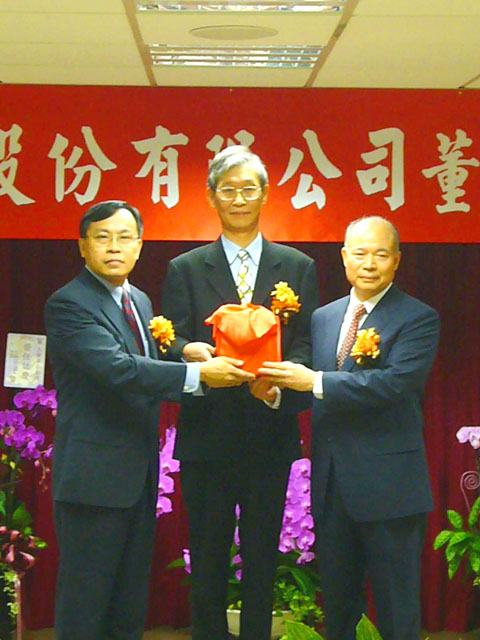Veteran financial official Wang Rong-jou (王榮周) took over the reins at Mega Financial Holding Co (兆豐金控) yesterday, vowing to raise the company’s return on equity (ROE) to more than 10 percent within three years.
The 62-year-old industry veteran voiced confidence that the nation’s third-largest financial services company by market value could realize the goal, despite the fact its ROE had stood at 4.99 percent for the first six months of this year.
Wang also said that under his leadership the company would strive to raise its return on assets to 1 percent, from the current 0.53 percent, in line with goals set by newly installed Financial Supervisory Commission Chairman Gordon Chen (陳樹).

PHOTO: LEE CHING-HUI, TAIPEI TIMES
With assets totaling NT$2 trillion (US$65.8 billion), Mega Financial posted a pre-tax profit of NT$5.8 billion in the first half of this year, a decline of 19 percent from the same period last year.
Former Mega Financial chairman Joseph Lyu (呂桔誠) said that profits would have hit NT$10.2 billion — a 40 percent increase from a year earlier — if the company had not lost NT$4 billion in investments linked to the US subprime mortgage crisis.
Wang, who voiced pride in his coordination and communication skills, said he believed Mega Financial could expand its business at home and abroad.
“I helped streamline Yuanta Commercial Bank [元大銀行] without causing any stir,” Wang said. “The reform successfully boosted the bank’s efficiency, although some people lost their jobs.”
Before being appointed to the helm of Mega Financial, in which the government has a 23 percent stake, Wang worked as Yuanta Bank president, vice minister of finance, investigation bureau chief and head of the national treasury agency, among other posts.
Wang said that Mega Financial was eyeing the capital market in China and the rest of the world, and that the company was in an advantageous position to expand its global footprint.
Once the government relaxes its rules, Mega Financial will seek to set up subsidiaries or branches in China,” Wang said. “I believe it is in the company’s interest to do so.”
The company has 179 branches and offices in Taiwan and 28 outlets overseas.
Wang was less clear about potential acquisition plans, saying he needed more time to evaluate whether to merge with other financial firms such as Taiwan Business Bank (台灣企銀), in which Mega Financial has a 14 percent stake.

KEEPING UP: The acquisition of a cleanroom in Taiwan would enable Micron to increase production in a market where demand continues to outpace supply, a Micron official said Micron Technology Inc has signed a letter of intent to buy a fabrication site in Taiwan from Powerchip Semiconductor Manufacturing Corp (力積電) for US$1.8 billion to expand its production of memory chips. Micron would take control of the P5 site in Miaoli County’s Tongluo Township (銅鑼) and plans to ramp up DRAM production in phases after the transaction closes in the second quarter, the company said in a statement on Saturday. The acquisition includes an existing 12 inch fab cleanroom of 27,871m2 and would further position Micron to address growing global demand for memory solutions, the company said. Micron expects the transaction to

Vincent Wei led fellow Singaporean farmers around an empty Malaysian plot, laying out plans for a greenhouse and rows of leafy vegetables. What he pitched was not just space for crops, but a lifeline for growers struggling to make ends meet in a city-state with high prices and little vacant land. The future agriculture hub is part of a joint special economic zone launched last year by the two neighbors, expected to cost US$123 million and produce 10,000 tonnes of fresh produce annually. It is attracting Singaporean farmers with promises of cheaper land, labor and energy just over the border.

US actor Matthew McConaughey has filed recordings of his image and voice with US patent authorities to protect them from unauthorized usage by artificial intelligence (AI) platforms, a representative said earlier this week. Several video clips and audio recordings were registered by the commercial arm of the Just Keep Livin’ Foundation, a non-profit created by the Oscar-winning actor and his wife, Camila, according to the US Patent and Trademark Office database. Many artists are increasingly concerned about the uncontrolled use of their image via generative AI since the rollout of ChatGPT and other AI-powered tools. Several US states have adopted

A proposed billionaires’ tax in California has ignited a political uproar in Silicon Valley, with tech titans threatening to leave the state while California Governor Gavin Newsom of the Democratic Party maneuvers to defeat a levy that he fears would lead to an exodus of wealth. A technology mecca, California has more billionaires than any other US state — a few hundred, by some estimates. About half its personal income tax revenue, a financial backbone in the nearly US$350 billion budget, comes from the top 1 percent of earners. A large healthcare union is attempting to place a proposal before